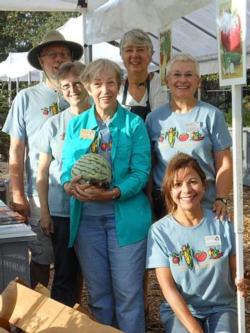Vegetable Demonstration Garden
Quick links
- Harvest Day
- Monthly tips
- Video Library
- AAS Display Garden
- Summer Problems
- Planting plans
- Straw bales
Selected topics:
- Slow Food Award (PDF)
- Beets
- Carrots
- Cover crops (PDF)
- Crop rotation
- Drought
- Lettuce in Summer
- Melons
- Mycorrhizae Test on Melons
- Raised beds
- Grow Sweet Potatoes (PDF)
- Sweet Potato Trial
- Tomatoes, Cherry (PDF)
- Tomato, Grafted
- Tomatoes, suggested varieties (PDF)
- Tomatoes, suggested varieties photos (PDF)
- More resources
Home » Fair Oaks Horticulture Center » Vegetables
Formal vegetable trials have been conducted on fresh market (hybrid) tomatoes, sweet corn, snap beans, summer squash and heirloom tomatoes. Multiple demonstrations and tastings have featured cherry tomatoes and melons.
| The Fair Oaks Horticulture Center vegetable garden has been formally recognized as an All-America Selections Display Garden! |

|
| Victory garden - heirlooms, hybrids, and All-American Selection (AAS) winners (vegetables, herbs, and flowers) | |
| Half wine barrels showcase vegetables, herbs, and beneficial insect-attracting flowering plants that can be successfully grown in containers. |
The vegetables in the demonstration garden are grown using water conserving and organic methods whenever possible. Those methods include the use of the following:
- Organic fertilizers (such as pelleted chicken manure, fish emulsion, seaweed/kelp)
- Organic soil amendments (such as compost)
- Cover crops that are grown to provide nutrients and “green manure” to the soil
- Crop rotation to help prevent the build up of soil-borne diseases and pests
- Soil solarization to kill many soil-borne diseases and some weeds
- Straw mulch to reduce weeds and keep the soil moist and cool
- Drip irrigation system to reduce water usage
- Environmentally sound pest management (such as blasting aphids and spider mites with water, hand-picking squash bugs, hand-picking weeds, covering plants with row covers to exclude pests, planting nectar-producing flowering plants that attract beneficial insects, and judicious use of insecticidal soaps and Bacillus thuringiensis (Bt) when necessary)
| More information about soil solarization. |









